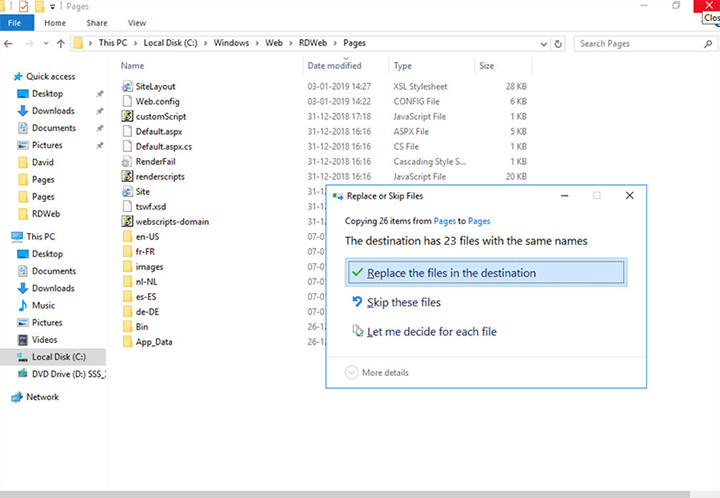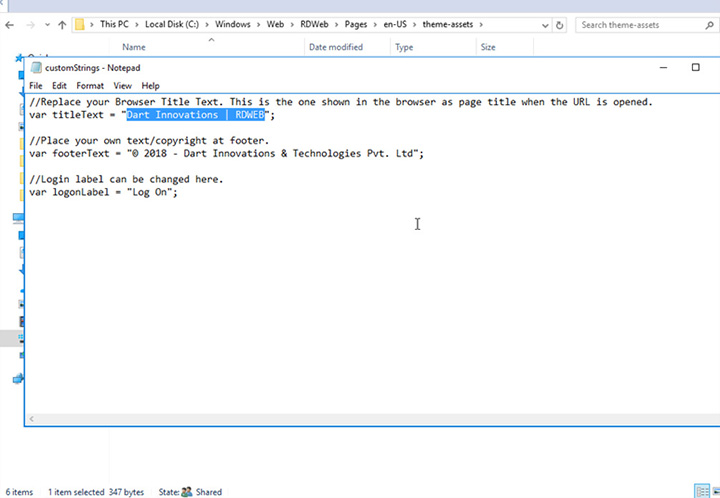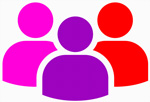RD Web 2022
Install guide for RD Web 2022 quick themes
This is a simple guide that explains how you install our Custom Themes quickly to reface your RD Web 2022 interfaces. However you will receive an install guide with all your theme downloads. Although this is same of the PDF guide you receive with your download, we recommend you to follow the PDF guide during your quick theme installation.
Installing Custom Theme for RD Web Access 2022 web portal
Backup your default RD Web Access interface
- Go to your RD Web Access 2022 server and explore to “c:\Windows\Web\RDWeb\”
- Copy ‘Pages’ folder and back up it somewhere on the system or in your network.
This is a safe way so you can revert back your default RD Web Access in case of any issues during the custom theme installation.
Install your Custom Theme
- Unzip your Custom Theme folder.
- Navigate to the folder ‘Custom-Theme\RDWeb\Pages\’.
- You can see the folders on language names; select the folder(s) of your language(s). For example ‘en-US’.
- Then select the files CustomScript.js and SiteLayout.xsl file. Ref: the image below.

- Copy the selected files.
- Now go to the folder “c:\Windows\Web\RDWeb\Pages\”.
- Paste the files and click ‘Replace the files in the destination’ if it alerts.

That’s all; you are done with the installation. Open the browser, type your RD Web Access URL and see the new interface on your RD Web Access URL.
Customizing images and texts
It is easier to replace your logo, background and footer text by following the simple steps below.
Navigate to the folder “c:\Windows\Web\RDWeb\Pages\en-US\theme-assets (Replace the ‘en-US’ with language folder you are customizing now). You can find all custom elements such as logo, background help icon, favicon and Custom Strings.
Replace the logo
Just copy your logo.png file and replace at this location. Make sure your logo image file doesn’t exceed the height of 60px. The width can be anything as you wish.
Replace background
The background file is a JPEG file. Name your background image as bg.jpg, copy and replace the file here. The dimension of 1920 * 906 pixels are good, however you can use any dimension.
Note: It is always good to keep the file optimized (kbs) as possible to keep the pages loading fast.
Replace Favicon
Use a 75 * 75 px .PNG file to replace the Favicon. File name should be Favicon.png.
Replace Help Icon
Help icon can be replaced as well in case if you like to. If so use 22px * 22px image file with the file name of help.jpg.
**The image dimensions we have mentioned are recommended sizes where you can use bigger or lesser sizes than these. Just place images, view on front and make your own assessments.
Replace Custom Strings
Open the file customStrings.js in a text editor (Ex: notepad). You can see the values of title text (which is the browser page title), footer text and logon label. Replace these strings with your own.

Important Notes and troubleshoot tips
- We have used ‘c:\’ drive throughout the guide as it is the most common default system drive. You may have your windows installed in a different drive. If so, just replace this with your system drive.
- After installation or customization you may feel your changes don’t reflect on the browsers. It may be a cache issue so please do a hard refresh or clear your browser cache.
- As instructed always backup your default interface files before you make custom installation or any upgrades.
Installing Custom Theme for RD Web 2019 Web Client version
Backup your default Web Client interface files
- Go to your RD Web system and open IIS
- Click your RD Web website/virtual App and expand the tree.
- Now select webclient, right click and click Explore.

- You will be landed at the directory called ‘Content’.
- Select All and copy all these files then backup somewhere.
This is a safe way so you can revert back your default RD Web Access in case of any issues during the custom theme installation.
Note: you mayn’t explore through windows explorer and go to content folder as top level folders on WebClient interface are protected. So just explore using IIS to WebClient content folder.
Install Custom Theme at WebClient
- Go to your extracted custom theme folder and navigate to WebClient>> Content folder.
- Select All and click Copy.
- Go to RD Web>>WebClientvia IIS and explore the directory. (If you have already opened the ‘Content’ folder of WebClient, then just go there.)
- Paste the files you copied and click Replace All.

That’s all you are now done with the custom theme installation.
Customizing images and texts
It is easier to replace your logo, background and footer text by following the simple steps below.
Navigate to the folder “Content/theme-assets”. You can find all custom elements such as logo, background help icon, favicon and Custom Strings.
Replace the logo
Just copy your logo.png file and replace at this location. A max width of 250px and max height of 80px looks good. However the dimension can be anything as you wish, just make your own assessment here.
Replace background
The background file is a JPEG file. Name your background image as bg.jpg, copy and replace the file here. The dimension of 1920 * 906 pixels are good, however you can use any dimension.
Note: It is always good to keep the image file optimized (kbs) as possible to keep the pages loading fast.
Replace Favicon
Use a 75 * 75 px PNG file to replace the Favicon. File name should be Favicon.png.
Replace Custom Strings
Open the file customStrings.js in a text editor (Ex: notepad). You can see the values of title text (which is the browser page title), footer text and login label. Replace these strings with your own. If you prefer not to show your logo on the after login portal then set the value of after Login Logo as ‘hide’ or ‘false’. You can also change the privacy policy label at login page with your own text and link. Leaving the string empty will help hiding the privacy policy link.

That’s all.
Important Notes and troubleshoot tips
- We have used ‘c:\’ drive throughout the guide as it is the most common default system drive. You may have your windows installed in a different drive. If so, just replace this with your system drive
- After installation or customization you may feel your changes don’t reflect on the browsers. It may be a cache issue so please do a hard refresh or clear your browser cache.
- As instructed always backup your default interface files before you make custom installation or any upgrades.


